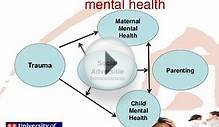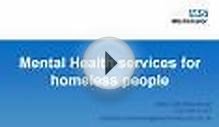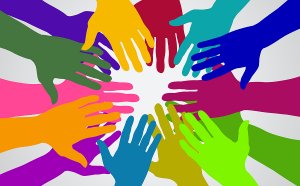
Mental Health Services For Homeless Persons
Ending homelessness requires housing combined with the types of services supported by HHS programs. The delivery of treatment and services to persons experiencing homelessness are included in the activities of the Department, both in five programs specifically targeted to homeless individuals and in fourteen non-targeted or mainstream, service delivery programs.
- are specifically designed for individuals or families who are experiencing homelessness.
- are designed to serve those who meet a set of eligibility criteria, which is often established by individual states, but are generally for use in serving low-income populations. Very often, persons experiencing homelessness may be eligible for services funded through these programs.
Targeted Homeless Assistance Programs
This multi-disciplinary comprehensive program provides primary health care, substance abuse treatment, emergency care with referrals to hospitals for in-patient care services, and outreach services to help difficult-to-reach homeless persons establish eligibility for entitlement programs and housing.
- PATH is a formula grant program that provides financial assistance to states to support services for homeless individuals who have serious mental illness or serious mental illness and substance abuse. Eligible programs and activities include outreach services; screening and diagnostic treatment services; habilitation and rehabilitation services; community mental health services; alcohol or drug treatment services; staff training; case management services; supportive and supervisory services in residential settings; referrals for primary health services, job training, educational services, and relevant housing services; and a prescribed set of housing services.
- The SSH program helps prevent and reduce chronic homelessness by funding services, in conjunction with permanent housing, for individuals and families experiencing homelessness living with a severe mental and/or substance use disorder. Grants are awarded competitively for up to five years to community-based public or nonprofit entities. Services supported under the SSH funding include, but are not limited to, outreach and engagement, intensive case management, mental health and substance abuse treatment, and assistance in obtaining benefits.
- GBHI is a competitively awarded grant program that enables communities to expand and strengthen their treatment services for people experiencing homelessness. Grants are awarded for up to five years to community-based public or nonprofit entities and funded programs and services include substance abuse treatment, mental health services, wrap-around services, immediate entry into treatment, outreach services, screening and diagnostic services, staff training, case management, primary health services, job training, educational services, and relevant housing services.
- The Basic Center Program helps create and strengthen community-based programs that meet the immediate needs of runaway and homeless youth under 18 years old. In addition, BCP tries to reunite young people with their families or locate appropriate alternative placements. Locate a basic center program.
The Transitional Living Program supports projects that provide long-term residential services to homeless youth. Young people must be between the ages of 16 and 22 to enter the program. Services are provided for up to 21 months. Young people who have not yet turned 18 at the end of the 21 months may be able stay until their 18th birthday. Maternity Group Homes for Pregnant and Parenting Youth support homeless pregnant and/or parenting young people, as well as their dependent children. Locate a transitional living program.
The Street Outreach Program enables organizations around the country to help young people get off the streets. The program promotes efforts by its grantees to build relationships between street outreach workers and runaway, homeless and street youth. Grantees also provide support services that aim to move youth into stable housing and prepare them for independence. The program’s ultimate goal is to prevent the sexual abuse or exploitation of young people living on the streets or in unstable housing. Locate a street outreach program.
The CABHI program supports the development and/or expansion of local efforts to integrate treatment and services for people with mental, substance use, or co-occurring disorders with permanent housing and other critical services. Grants are awarded competitively for up to three years to community-based public or nonprofit entities to build upon the success of the Services in Supportive Housing (SSH) programs. The program aims to ensure that individuals who experience chronic homelessness receive access to permanent housing, treatment, and recovery support services. Funds provide behavioral health treatment and other recovery-oriented services; improve the sustainability of integrated community systems that provide stable and affordable housing and other related supportive services; and increase client enrollment for health insurance, Medicaid, and other mainstream benefits. Grantees must establish a community consortium and steering committee to help guide program integration and implementation.
The CABHI-States program works to enhance states’ treatment services infrastructure to better provide accessible, effective, comprehensive, coordinated/integrated, and evidence-based treatment services; permanent supportive housing; peer supports; and other critical services to veterans who experience homelessness or chronic homelessness, and other chronically homeless individuals with SMI, substance use disorders, or co-occurring disorders. Grants are awarded to enhance statewide planning and infrastructure development; deliver behavioral health, housing support, peer and other recovery oriented services; and engage and enroll individuals in Medicaid and other mainstream benefits. Grantees must establish a state interagency council to guide program integration and implementation.
Supportive Services: Non-targeted or Mainstream Programs
Access to Recovery supports a grantee-run voucher program to expand clinical substance abuse treatment and recovery support services to reach those in need. These competitive grants are awarded to grantees who approach and target efforts to areas of greatest need, areas with a high degree of readiness, and to specific populations, including adolescents.
The Child Support Enforcement Program is a federal/state/tribal/local partnership to help families by promoting family self-sufficiency and child well-being. All States and territories run a child support enforcement program. Families seeking government child support services must apply directly through their state/local agency or one of the tribes running the program. Services are available to a parent with custody of a child whose other parent is living outside the home, and services are available automatically for families receiving assistance under the Temporary Assistance for Needy Families (TANF) program.
RELATED VIDEO



Share this Post
Related posts
Community Mental Health Services Block Grant
What is the Community Mental Health Services Block Grant (MHBG)? The MHBG program s objective is to support the grantees…
Read MoreCommunity Mental Health Services
Community Behavioral Health (CBH) is a not-for-profit 501c (3) corporation contracted by the City of Philadelphia to provide…
Read More










